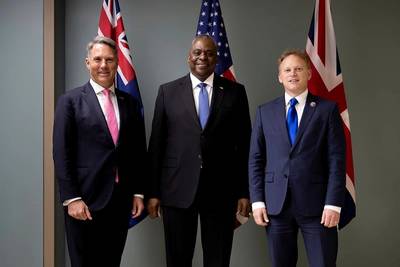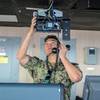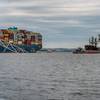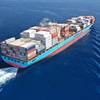AUKUS Defense Ministers Agree to Bolster Security
AUKUS defense ministers have reaffirmed their resolve to bolster security and stability and ensure that the Indo-Pacific remains a region free from coercion and aggression.
A statement was released after Secretary of Defense Lloyd J. Austin III hosted Richard Marles MP, Deputy Prime Minister and Minister for Defence, Australia, and Grant Shapps, Secretary of State for Defence, United Kingdom, at the Defense Innovation Unit Headquarters in California on December 1.
AUKUS is a trilateral security partnership for the Indo-Pacific region between Australia, the United Kingdom, and the United States.
The officials reaffirmed the three nations' commitment to maximize the strategic and technological advantage of AUKUS by combining national strengths and pooling resources to deliver game-changing capabilities. They agreed that advancing AUKUS requires continued commitment to streamlining defense trade controls and information-sharing while minimizing policy and financial barriers across public and private sectors. They therefore directed their organizations to continue taking additional steps to promote efficient defense and industrial collaborations.
They endorsed the following announcements and initiatives:
PILLAR I — CONVENTIONALLY ARMED, NUCLEAR-POWERED SUBMARINES
The Secretaries and Deputy Prime Minister reaffirmed their commitment to establishing Submarine Rotational Force-West (SRF-West) in Australia as early as 2027, selling U.S. Virginia-class submarines to Australia from the early 2030s, and delivering SSN-AUKUS to the Royal Navy in the late 2030s and the first Australian-built SSN-AUKUS to the Royal Australian Navy (RAN) in the early 2040s.
Increased Royal Australian Navy Education and Training. The officials acknowledged the significant progress on increased education and training opportunities for RAN personnel to attend specialized U.S. and UK schools, including training at the U.S. Submarine School in Groton, U.S. Nuclear Power School in Charleston, and the UK Nuclear Power School at HMS Sultan. Six RAN officers have now graduated the U.S. Nuclear Power School, with a further three RAN officers on track to graduate from the UK Nuclear Power School in January 2024. This follows two RAN officers who have completed other Sultan nuclear operator courses, with two more planned. These pioneering cohorts will be the first to operate Australia's future nuclear-powered submarines.
Increased Industry Training. The Secretaries and Deputy Prime Minister were pleased that the first tranche of Australian industry personnel have commenced work at Pearl Harbor Navy Shipyard in the United States and Barrow-in-Furness shipyard in the UK to develop their skills to build and sustain nuclear-powered submarines. This will support future maintenance activities during nuclear-powered attack submarine (SSN) visits to Australia.
Preparing for Submarine Rotational Force-West. Efforts are well underway to increase Australia's experience with nuclear-powered submarines and build Australia's capacity to participate in future maintenance activities. Australian sailors will commence duty in Guam in early 2024 to build their SSN maintenance skills and qualifications in the lead up to SRF-West. The officials also agreed to the increased frequency of SSN visits to HMAS Stirling in 2024, building on the USS North Carolina visit in August 2023. The next U.S. SSN visit is planned to occur in the first half of 2024. The first planned maintenance activity of a U.S. SSN is planned to occur at HMAS Stirring in the second half of 2024. This will represent a substantial increase in Australian Defense Force participation in maintenance activities on U.S. SSNs. The UK reiterated its commitment to increasing SSN port visits beginning in 2026.
Upholding the Highest Non-Proliferation Standard. The officials reaffirmed their shared commitment to upholding the highest standard for nuclear non-proliferation, and welcomed the regular, open, and transparent engagement with the International Atomic Energy Agency (IAEA) to date. They acknowledged commencement of Australia's bilateral negotiations with the IAEA on an arrangement pursuant to Article 14 of Australia's Comprehensive Safeguards Agreement.
Enabling Legislation. The officials welcomed the new Foreign Military Sales case between Australia and the United States presented to the U.S. Congress, which will facilitate early delivery of capability to support SRF-West and provide mechanisms to train Australians. They also welcomed Australia's introduction of legislation to the Australian Parliament which will establish the framework to ensure nuclear safety within Australia's nuclear-powered submarine enterprise, including establishing an independent nuclear safety regulator. They also welcomed the entry into force of the first AUKUS enabling legislation introduced to the Australian Parliament, the Defence Legislation Amendment (Naval Nuclear Propulsion) Act 2023, in July 2023.
PILLAR II — ADVANCED CAPABILITIES
Pillar II is accelerating and deepening the development and delivery of advanced military capabilities. While many AUKUS-related advanced capability activities remain classified, the Secretaries and Deputy Prime Minister shared the following commitments:
AUKUS Maritime Autonomy Experimentation and Exercise Series. The AUKUS partners will undertake a series of integrated trilateral experiments and exercises aimed at enhancing capability development, improving interoperability, and increasing the sophistication and scale of autonomous systems in the maritime domain. The experiments and exercises will provide opportunities for defense industry to participate in capability demonstration, development, and delivery. Through these experiments and exercises, the AUKUS partners will also further test and refine the ability to jointly operate uncrewed maritime systems, share and process maritime data from all three nations, and provide real-time maritime domain awareness to support decision-making.
Trilateral Anti-Submarine Warfare. The AUKUS partners have demonstrated and will deploy common advanced artificial intelligence (AI) algorithms on multiple systems, including P-8A Maritime Patrol Aircraft, to process data from each nation's sonobuoys. These joint advances will allow for timely high-volume data analysis, improving our anti-submarine warfare capabilities.
Undersea Vehicle Launch and Recovery. The AUKUS partners are integrating the ability to launch and recover undersea vehicles from torpedo tubes on current classes of submarines to deliver effects such as strike and intelligence, surveillance, and reconnaissance. This capability increases the range and capability of our undersea forces and will also support SSN-AUKUS.
Quantum Positioning, Navigation, and Timing. The AUKUS partners are accelerating the development of quantum technologies for positioning, navigation, and timing in military capabilities. These capabilities create resilience for our trilateral forces in Global Positioning System-degraded environments and enhance stealth in the undersea domain, which will also support SSN-AUKUS.
Resilient and Autonomous Artificial Intelligence Technologies (RAAIT). The AUKUS partners are delivering artificial intelligence algorithms and machine learning to enhance force protection, precision targeting, and intelligence, surveillance, and reconnaissance. This effort builds on joint work demonstrated in the UK in April 2023 and in South Australia in October 2023. The AUKUS nations aim to integrate RAAIT into national programs in 2024, to pursue the rapid adoption of these technologies across land and maritime domains.
Deep Space Advanced Radar Capability. AUKUS is accelerating capabilities that provide trilateral partners with advanced technology to identify emerging threats in space. AUKUS played a critical role in advancing trilateral collaboration on the Deep Space Advanced Radar Capability program, which will provide 24-hour continuous, all-weather global coverage to detect, track, and identify objects in deep space and increase space domain awareness. This capability will contribute to the security, safety, and responsible use of space. Sites will be in the United States, United Kingdom, and Australia. The first radar site in Western Australia will be operational in 2026, with all three in service by the end of the decade.
Cyber. AUKUS partners are collaborating with industry partners to deploy some advanced tooling which will uplift the cyber security of supply chains, while also giving greater insight into the threats to AUKUS. The AUKUS partners are also working to strengthen cyber capabilities, including protecting critical communication and operations' systems.
Establishing Trilateral Requirements. The AUKUS partners are committed to ensuring AUKUS capability and technology development focuses on the most important military challenges each nation faces. The officials noted that the International Joint Requirements Oversight Council, co-chaired by the Vice Chiefs of Defense from the United States, the United Kingdom, and Australia, is a key collaborative forum for identifying and validating operational requirements common to the three nations that will contribute to deterrence and their ability to prevail if deterrence fails.
AUKUS Innovation Challenges. The AUKUS partners will launch a series of AUKUS innovation challenges in which companies from across all three innovation ecosystems will be able to compete for prizes on a common innovation challenge topic. In early 2024, partners will launch the first trilateral Innovation Prize Challenge, focusing on electronic warfare.
Defense Trade and Industrial Base Collaboration. The AUKUS partners are working to facilitate deeper and more rapid defense trade between the three nations by streamlining policies and processes, along with implementing comparable security standards for guiding the transfer of sensitive military technology, data, and know-how. These efforts, including proposed legislative changes, will increase private-sector cooperation across the AUKUS partners in emerging technologies and strengthen resiliency across supply chains.
AUKUS Advanced Capabilities Industry Forum. The AUKUS partners will establish and convene a standing Industry Forum with trilateral government and industry representatives to help inform policy, technical, and commercial frameworks to facilitate the development and delivery of advanced capabilities. The first meeting will occur in the first half of 2024.
AUKUS Defense Investors Network. The AUKUS partners are increasing and expanding private sector engagement by welcoming the creation of an AUKUS Defense Investors Network, leveraging the current networks in all three countries to strengthen financing and facilitate targeted industry connectivity.
The AUKUS partners remain committed to deepening trilateral collaboration, enhancing information and technology sharing, and integrating their defense industrial bases to further strengthen joint capabilities and increase resiliency across the three nations.











